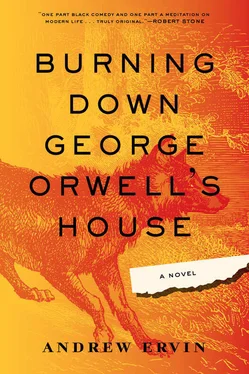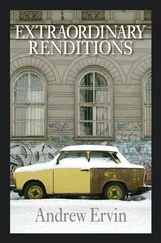It was at that moment that Ray felt something watching him. Maybe it was just the exhaustion or whatever, but he felt some thing , a palpable, animal presence denser than the bushes in which it stirred. Two glossy eyes flickered at him, close to the ground, and then were gone.
Back in the house, he locked the door behind him. Screw local custom. The fire had died and the interior was pitch black. He couldn’t tell if his eyes were open or closed. Navigating to the kitchen would require an understanding of the domestic layout he did not yet possess. He had found a box of matches, but to get them again he needed to traverse a thousand miles through the dining room and then to the windowsill above the sink. He shuffled his feet across the dusty floor, reaching blindly for walls, chairs, tables. That creature was lurking outside. He was naked and blind, cocooned in mud and in a strange house in a foreign nation whose language he understood so well yet which remained incomprehensible. Twenty paces took twenty minutes.
He found a drawer full of candles and had just enough light to drink a long gulp from a bottle of scotch and get upstairs. He pulled a musty quilt from the closet, and — still muddy and terrified — climbed into bed and slept for fourteen hours.
It must have been autumn the first time Ray ran away from home. The corn had been harvested — he remembered that much — and only the broken shoots remained. It was field mouse season, when the fleet of combine harvesters would send the critters into the house for shelter. The peanut-buttered traps snapped as soon as his mother could reset them. Ray had had no motivation for leaving other than curiosity. He could already sense that so many things existed beyond his limited understanding and wanted to see what else was out there and then what was beyond that. He needed to know everything that the world contained. His sister turned her back for a moment, and he escaped into a wasteland of clear-cut prairie that extended a hundred million miles in every direction.
The newfound expansiveness of the land created a seismic reconfiguring of his four-year-old self. The cornstalks chopped at his bare feet. The dust and debris of the fields filled his nose. He kept walking, but not necessarily away from anything.
At that time, the Welter farm occupied seventy acres, which Ray Senior had dedicated to the planting of soybeans and feed corn. Even as the nation’s thirst for ethanol fuel grew, the family business was already becoming less viable. Every day, construction trucks ferried particleboard and faux-stone panels to the new housing developments at the remotest reaches of the property, which his dad had been forced to sell off piecemeal. That was where Ray headed, toward the clamor of hammering and sawing and engine noise.
After an hour, he arrived in a vast new kingdom where dozens of steamrollers and cement mixers, backhoes and dump trucks had gathered around the plywood skeletons of the new subdivision castles. The sound was wondrous: a gas-powered symphony of sonic textures and tone colors. Then it all stopped. There was some commotion, and a man in a hardhat lifted Ray into a pickup and drove him back to the house. The ride took two minutes. He had been so close to home the entire time. The stranger carried him under his arm like a sack of feed corn, ascended the porch, and knocked on the door. Ray’s mother answered.
He didn’t understand the conversation but understood all too well the worry he had caused. His father would hear about this. He was thrown into the tub, from where he heard his mother hollering at poor Becky because of his transgression.
Not long after that, seventy acres became forty and then later twenty. The civilized world metastasized onto the fragrant fields that had been his personal playground. Ray and his new neighborhood friends rode their dirt bikes for hours, pissed on passing freight trains, set up their own hobo camp under the interstate. The houses and cars and people continued to encroach upon his childhood home until only a few acres remained and Ray’s father fired his last workers and took a job at the factory two towns over.
Ray, a few years later, got accepted into the big land-grant university further downstate and it was during the second semester of freshman year that he first read Nineteen Eighty-Four . He picked it up for the first time while eating lunch, and it had grown dark by the time he finished the appendix. The book came as a revelation.
Orwell had predicted everything . It was uncanny. His invention of Big Brother had come to fruition in the form of a vast network of conjoined consumers and Ray now understood that he was one of them. How many times had he caught himself wandering through the mall and spending money as a form of entertainment? He surfed the web and purchased things he didn’t need in order to distract himself for a few moments from all the bad shit on the evening news. He had been marketed to so constantly and so effectively that he stopped noticing it — until he read Nineteen Eighty-Four . Orwell had revealed how the world really operated. Winston Smith’s ordeal at the hands of the totalitarian state stayed with Ray for weeks; he couldn’t stop thinking about that terror and about how he might live his own life without becoming equally enslaved by the system. That was when he declared a major in advertising, where his talent for invention — or his “genial wise-assery,” as his father called it — could be put to lucrative use. The decision was more than financial, however. Ray knew that some key to his self-preservation sat hidden among the now dog-eared pages of Nineteen Eighty-Four .
The book’s pseudo-academic appendix “The Principles of Newspeak” served as a detailed linguistic analysis of Big Brother’s state-mandated language. By changing the official language to Newspeak, the government of Oceania sought to eliminate unnecessary and redundant words, to make the citizens’ vocabulary smaller in order to limit what kinds of thoughts were even possible. The people couldn’t revolt if they couldn’t even conceive of the word revolution . Ray wanted to apply the same concept to advertising. Consumers didn’t really want to make choices — they wanted the illusion of choice. By changing the way people thought, he could also alter their behavior, especially their spending habits. It sounded so easy, and it was.
A career in advertising would also allow Ray to escape the growing claustrophobia of small-town life for good. Living away from home in the dorms had rekindled his childhood curiosity. The world intimidated him with its vastness, but he still needed to see all of it. Every inch.
UPON GRADUATION HE MOVED to Chicago and in the fall he started his paid internship with the ad agency Logos. The company was known worldwide — it had been responsible for some of the biggest campaigns in recent advertising history. They had popularized Japanese cars in the American-manufacturing Midwest and convinced vast swaths of the electorate to vote against their own best interests in a presidential election. They had proved that choosing one brand of shitty cola over another was a statement of personal identity. He read articles and highlighted the important info, which he then converted into bullet points. The work was tedious, but easy.
He lived in an otherwise Bosnian enclave on the far North Side. The local community center brought in a wild Balkan orchestra from time to time, and Ray learned how to dance the kolo, albeit with some moves of his own invention mixed in. After he had spent another weekend drinking too much and making out with any number of Yugoslavian girls with lots of j ’s and z ’s in their names who pretended not to understand his English, he crawled back into his cubicle one Monday morning to find an email summoning him to his manager’s office. Someone in the elevator had no doubt smelled the homemade rakija still seeping from his pores and dimed him out. Was he still drunk? It was certainly possible. His clothes reeked.
Читать дальше












